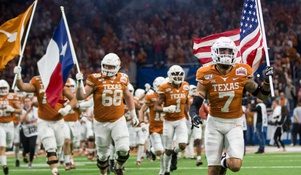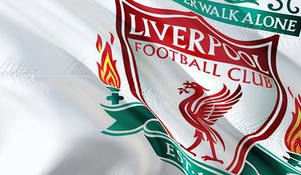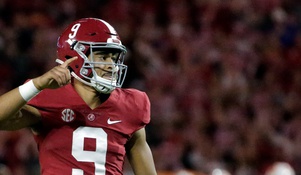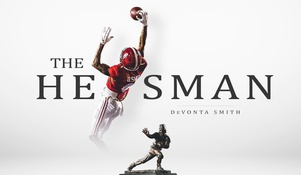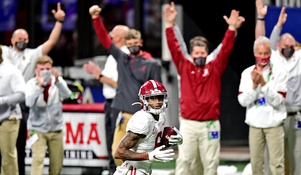Top Ten Heisman Snubs
The ultimate trophy in College Football is the Heisman trophy. The award displays the best player in college football for that season. However, there are some years that make us as fans of the sport question the committee’s choice thinking that there was a better option. Here are my top ten Heisman snubs. Keep in mind that time is hard to measure as 3,000 passing yards in today’s game is completely different from 3,000 passing yards in 1970. I also could not include players from the early years of College Football so I must apologize to those who hate Notre Dame and don’t think that Paul Hornung deserved the Heisman trophy in 1956. Let’s jump right in.
10. The year: 1982
Who should’ve won; John Elway (3,242 passing yards, 24 passing touchdowns, 12 interceptions)
The actual winner; Herschel Walker (1,752 rushing yards, 12 touchdowns)
In hindsight this feels like one of the greatest snubs, one of the best quarterbacks the game had seen not winning the Heisman. Elway got unlucky since he was playing at a time of one of the greatest College Football players the game had seen. Herschel Walker was dominant in his time at Georgia, and was the best player in the game. It’s also noteworthy that John Elway led a Stanford team to a mediocre 5-6 record while Walker led the Georgia Bulldogs to an 11-1 record and a near National Championship. Elway had a great season on a bad team, just unfortunate for his Heisman campaign.
9. The year: 1970
Who should’ve won; Joe Theismann (2,429 passing yards, 16 passing touchdowns, 14 interceptions)
The actual winner; Jim Plunkett (2,980 passing yards, 19 passing touchdowns, 19 interceptions)
Jim Plunkett beat out Joe Theismann in a race that could have gone either way. While Jim Plunkett led Stanford to a 9-3 record, Theismann led Notre Dame to a 10-1 record and #2 in the final AP poll (plus Theismann changed the pronunciation of his name to sound like Heisman in hopes to win the trophy). Plunkett didn’t deserve the Heisman any more than Theismann did, Plunkett must have made some deal with the devil where he can win the trophy but no other Stanford Cardinal is allowed to win afterward (or Joe Theismann put a curse on Stanford, either way works).
8. The year: 2017
Who should’ve won; Bryce Love (2,118 rushing yards, 8.1 yards per carry, 19 rushing touchdowns)
The actual winner; Baker Mayfield (4,627 passing yards, 43 passing touchdowns, 6 interceptions)
Bryce Love suffered from the east-coast bias many Pac-12 players suffered before him. At first, everyone thought Saquon Barkley was going to win the Heisman, not noticing that a running back from Stanford was putting up better numbers (late at night of course). When Barkley’s production tailed off at the end of the year, it looked like Bryce Love was going to win the Heisman, that’s where Baker Mayfield came in. Baker Mayfield was putting up mind-blowing numbers in Lincoln Riley’s air-raid offense and was leading Oklahoma to the College Football Playoff. Mayfield checked off more boxes for the voters in terms of importance of position and relevancy of team, however many thought Bryce Love had the best season in College Football that year.
7. The year: 2006+2007
Who should’ve won; Darren McFadden (2006- 1,647 rushing yards, 15 touchdowns) (2007- 1,830 rushing yards, 17 touchdowns)
The actual winners; 2006- Troy Smith (2542 passing yards, 36 passing touchdowns, 6 interceptions) 2007- Tim Tebow (3,286 passing yards, 32 passing touchdowns, 6 interceptions, 895 rushing yards, 23 touchdowns)
Darren McFadden was one of the most exciting players the college football game had seen. The best running back in the game was also able to become a passing threat as well as the Razorbacks best receiver posing a triple threat for defenses.
McFadden lost to Troy Smith in 2006 and only two reasons come to mind for McFadden losing to the dynamic Buckeye quarterback. 1) The Buckeyes were one of the best teams in the country while Arkansas went 10-4 that year (better records always are favored in Heisman voting). 2) Troy Smith was receiving the Heisman as a career achievement award, statistically Smith had a better Junior season but didn’t appear as a Heisman finalist and the committee wanted to give him the award in his final season.
McFadden got a little unlucky for his 2007 Heisman campaign. Mcfadden was one of the most exciting players in College Football history but Tim Tebow is one of the greatest the game had ever seen. Tebow had an incredible 2007 season as he led the Florida Gators to a National Championship.
6. The year: 2010+2011
Who should’ve won; Andrew Luck (2010- 3,338 passing yards, 32 passing touchdowns, 8 interceptions) (2011- 3,517 passing yards, 37 passing touchdowns, 10 interceptions)
The actual winners; 2010- Cam Newton (2,854 passing yards, 30 touchdowns, 7 interceptions, 1,473 rushing yards, 20 rushing touchdowns). 2011- Robert Griffin III (4,293 passing yards, 37 passing touchdowns, 6 interceptions, 699 rushing yards, 10 touchdowns)
Andrew Luck was the best pocket passer in College Football and helped Stanford become one of the top teams in the country. Luck was regarded as the best quarterback prospect the game had seen in a long time and ultimately became the number one pick in the 2012 NFL Draft. Unfortunately for Luck, he finished in second place two years in a row to a rising dual threat quarterback that swept the nation (and wasn’t playing on primetime and not in the late times of the west-coast). I personally thought Luck should have won the Heisman in 2011 over RG3, Luck had the better team Griffin had the better numbers, the voters chose numbers.
5. The year: 2015
Who should’ve won; Christian McCaffrey (2,019 rushing yards, 645 receiving yards, 13 touchdowns)
Who actually won; Derrick Henry (2,219 rushing yards, 91 receiving yards 28 touchdowns)
Once again the West Coast snubs a Heisman. Christian McCaffrey was one of the more dynamic players and the greatest all-around offensive player in the game that year. Christian McCaffrey was not only helping Stanford win in the run game, he was also making a difference in the receiving game and the return game (kickoffs and punts). Derrick Henry was only a threat in the running game, I know he was an unstoppable force in the running game but regardless, Henry wasn’t as valuable an offensive player as McCaffrey was. Henry ultimately won the award as part of a National Championship team (hence the argument that Henry led the Crimson Tide to a National Championship). What voters failed to realize was the supporting cast that Derrick Henry had that Christian McCaffrey didn’t have. Alabama ended up sending players to the NFL from every position being the football factory they were, Stanford sent a few players to the NFL in the following seasons (McCaffrey being one of them), one could argue that Christian McCaffrey carried the Cardinal to relevancy that season.
4. The year: 1983
Who should’ve won; Steve Young (3,902 passing yards, 33 passing touchdowns, 10 interceptions 8 rushing touchdowns)
Who actually won; Mike Rosier (2,148 rushing yards, 29 touchdowns)
Steve Young, like John Elway became the better player in the NFL and lost to one of the greatest running backs at the time and possibly ever in college football. Steve Young had a few things go against him that cost him the Heisman. He had a small school bias, usually players that win the trophy come from big schools like Oklahoma or Ohio State (Mike Rosier went to Big Red, one of the best programs at the time). Young, despite leading BYU to an 11-1 record, was competing against Mike Rosier, the lead back that was part of a team that came second in the National Championship running in Nebraska. If you swapped Steve Young and Mike Rosier and they still had similar enough stats (granted BYU was more run and shoot while Nebraska was a run-first team) Steve Young would likely have won the Heisman. Steve Young was one of the most talented players in the nation if not the most talented but played for a school that wasn’t part of any major conference or played any tough games.
3. The year: 2018
Who should’ve won; Tua Tagovailoa (3,966 passing yards, 43 passing touchdowns, 6 interceptions)
Who actually won; Kyler Murray (4,361 passing yards, 42 passing touchdowns, 7 interceptions, 1,001 rushing yards, 12 rushing touchdowns)
I was convinced from the beginning of the year that Tua Tagovailoa was going to win the Heisman and many voters probably thought so as well (the polls showed Tua was the frontrunner). While Kyler Murray may have had better numbers, Tua looked like the better quarterback with his ability to make any throw and hit any receiver in any tight window. Tua was leading the best team while Kyler was leading Oklahoma to the playoff, while Tua had the better supporting cast Kyler had the better system which allowed him to accel in (Baker Mayfield looked incredible in Lincoln Riley’s system the year before and Jalen Hurts also did the year after Murray). The final week of the regular season (the Conference Championship week that is) can be seen as the week that Murray stole the Heisman, Tua got hurt in the S.E.C. Championship game while Kyler Murray helped Oklahoma erase a late deficit against Texas to secure a spot in the playoff (and another Heisman in Oklahoma). At least Tua got his revenge when Alabama dominated Oklahoma in the College Football Playoff semifinal game (a 45-34 victory but a 31-10 halftime lead, a game that got out of hand quickly).
2. The year: 2009
Who should’ve won; Toby Gerhart (1,871 rushing yards, 28 rushing touchdowns)
Who actually won; Mark Ingram (1,658 rushing yards, 17 rushing touchdowns, 3 receiving touchdowns)
You can almost make a list of the top Stanford players that were snubbed of the Heisman. John Elway, Andrew Luck, Christian McCaffrey, Bryce Love, you’d think that Stanford has some curse on them. No Stanford player was passed on the way Toby Gerhart was. Gerhart had better stats than the eventual Heisman winner Mark Ingram in almost every significant category. Gerhart also was in his final season of his Stanford career while Ingram was only a Sophomore (usually upperclassmen sway voters away from lowerclassmen). Ingram, like Derrick Henry years later (who also beat out a Cardinal in the Heisman race) was part of a National Championship Alabama program, while Gerhart was part of an 8-5 Stanford program. Ingram also became the first player from Alabama to ever win the Heisman and it’s possible that the history on the line pushed the voters to make Ingram the Heisman. Toby Gerhart has one of the more forgotten great seasons of all-time, it doesn’t help that he didn’t win the Heisman or has a stellar NFL career to back it up.
1. The Year: 1997
Who should’ve won; Peyton Manning (3,819 passing yards, 36 touchdowns, 11 interceptions)
Who actually won; Charles Woodson (7 interceptions, 4 touchdowns)
The debate continues to this day. Should the quarterback that picked apart every defense who ended up becoming one of the greatest passers of all-time win the Heisman? Or should the defensive back that offenses had to constantly avoid have won the Heisman. Peyton Manning finished off an incredible career at Tennessee with his best season and led the 'Vols to an impressive 11-2 record for 6th in the AP final poll. Charles Woodson was a jack of all trades playing safety and cornerback on defense while also being able to play receiver on offense and return kicks and punts on special teams. What many consider to have put Woodson over the top and give him the Heisman was his “Heisman moment”, when he returned a punt against rival Ohio State for a touchdown. Peyton never had a “Heisman moment” but he had one of the greatest careers in College Football history, which he backed up with one of the greatest NFL careers in history, it’s just a shame he never had a Heisman to add to the awards.

